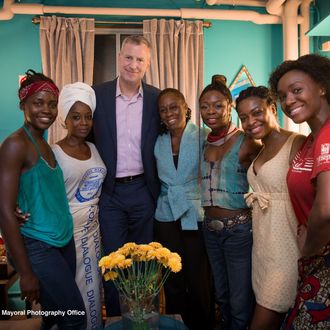
At 5:30 on Friday, March 11, as I was winding things up at the office to prepare to meet my boyfriend to see Eclipsed, I got an email from the mayor’s office: He was going to be there, too — also on date night, I was informed. And sure enough, as I arrived at the theater, there were police there and a photographer from the Times loitering out front, waiting to capture their arrival. The play was written by Danai Gurira (whom you know as Michonne in The Walking Dead) and is set at the end of the long Liberian guerilla war. It stars Lupita Nyong’o and was recently transferred from the Public Theater to Broadway. Sure enough, right as the play was about to begin, Mayor de Blasio loped in with Chirlane McCray, and they were seated opposite us. The mayor — who is, in fact, uncomfortably tall — folded himself into an aisle seat and slouched down a bit so as not to block anyone behind him.
Afterward, the mayor’s office asked me whether I’d be writing about the couple’s trip to the theater (a similar question was presumably asked of the Post, who published the email from the mayor’s office almost word for word in “Page Six”). I told the press representative I didn’t really know what I’d write, not unless I could get the mayor or the First Lady on the phone. The next day, I got a call from McCray; she was calling, accidentally, from her cell phone, and quickly hung up to call back again through her office. At that point I asked her why she and her husband decided to take in this particular show. She didn’t, it turns out, know much about the playwright or the play (and doesn’t watch The Walking Dead), but the show’s producers had brought it to the attention of the mayor’s office, and the fact that it was Broadway’s first all-female cast and creative team — some of whom had roots in different parts of Africa — made her want to see it. “I was just intrigued by the conversations they may have had as they were working on the show together,” she said. “All-female, multiethnic, coming together … ” (Gurira is from Zimbabwe, via Iowa; Nyong’o is from Kenya; and actress Akosua Busia is from Ghana. Liesl Tommy, the director, is from South Africa.)
The story is mostly set in a claustrophobic compound, home to the captive “wives” of a rebel warlord, and explores how each responds to their sexual enslavement. The four women are known by their numbers, which correspond to the length of time since they were acquired by the warlord (who is never seen). There is also a fifth woman, from the outside, a peace activist from the city who was there trying to convince the rebels to put down their arms. The characters were inspired by people Gurira met doing her research for the play, interviewing women in Liberia, after being intrigued by a picture in the Times of female soldiers (“they were fierce, and they were African, and they had AK-47s, and they had cute little outfits on at the same time, and they were really scary chicks,” Guiria told me a few years back). One of the wives, No. 2 (actual name: Maima), gains a measure of independence — or at least gets to leave the sexual enslavement of the compound — by becoming a soldier.
McCray said they were each “recognizable, like women you know,” only put in extreme circumstances. The play reminds the audience that Liberia came to exist because of American former slaves settled there. And the question she had is: How different are we than they are?
While McCray said that she and the mayor didn’t have much time to talk about it afterward — their schedule didn’t to allow for that — two moments struck her most. The first was when the peace activist taught one of the illiterate wives how to write her name in the sand with a stick (“she could see the power of it, to name oneself, articulate it in writing”). And then there was when Maima, the one who chose to become a soldier, had convinced Nyong’o’s character, known simply as the Girl, to follow her path and take up arms. Maima must remind the Girl that she must then kill the government soldiers to gain her own measure of self-determination:
“LISTEN TO ME! Dose are Charles Taylor’s monkeys! Dat who we fightin’. We are fighting de monkey Charles Taylor. He eating and drinking and living like a king in a land of paupers. We drive him out … ” She gets her to shoot. “Good gal. Now you doin’ sometin’, you hepin’ us get closa to freedom. One monkey at a time … ”
It’s a powerful moment. “To make a human being into something not human, to make it easier for her to kill … ” McCray said, still unsettled by it. “It’s something we see now, with Trump, and the violence, the denaturing of the human. I don’t think it’s an easy thing.” But it happens, and is happening.





























